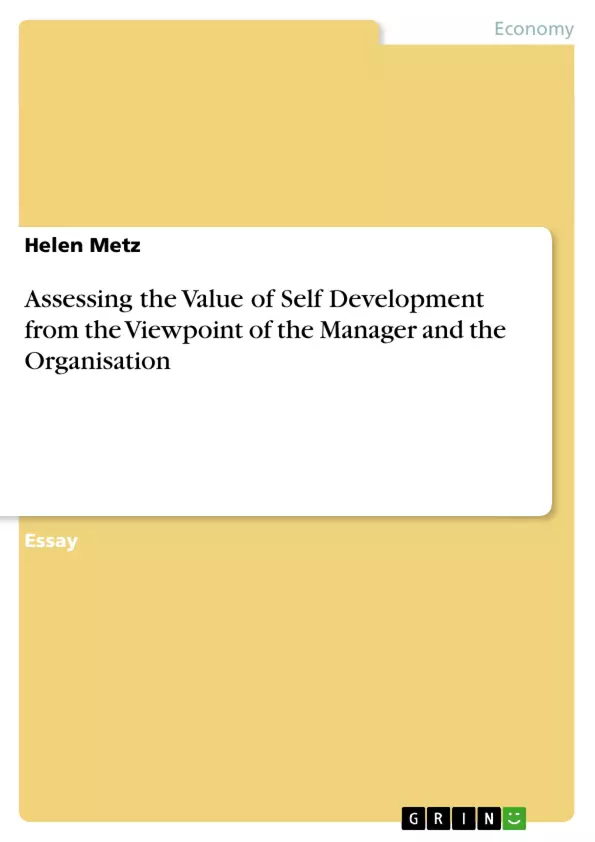The key element of self development is that individuals take responsibility of their
own learning. The learner identifies learning needs, determines the learning goal,
selects the method on how to achieve it and initiates it. The role of the development
specialist becomes that of a facilitator, counsellor or supporter rather than the
provider or initiator of development opportunities (Pedler, 1988; Pedler et al., 2007).
Self development takes into consideration that approximately 80 per cent of learning
is through experience and integrates learning in the context where it happens. Self
development is not only about enhancing professional skills and performance; it is
also about personal growth (Boydell and Pedler, 1981; Megginson and Pedler, 1992).
For self development to be beneficial to the individual as well as the organisation,
supplementary activities, such as development centres, personal development plans
or competency dictionaries can offer guidelines to the individual (Antonacopoulou,
2000). Self development should not be regarded as separate to organisational
development, but rather as an integral component (Smith, 1990). Self development
ought to be “[…] a developmental strategy which is beneficial both to the individual
and the organisation. […] many of the perceived benefits from self-development are
highlighting the integration of individual development and organisational
development.” (Antonacopoulou, 2000:492)
In the following the benefits of self development for the manager and the organisation
are analysed separately and ultimately summarised in the conclusion.
Inhaltsverzeichnis (Table of Contents)
- Introduction to Self Development
- Value of Self-Development for the Manager
- Tailoring Development
- Taking Ownership of Development
- Driving Employability
- Value of Self-Development for the Organisation
- Adapting to Environmental Changes
- Enhancing Organisational Performance
- Attracting and Retaining Employees
- Conclusion
Zielsetzung und Themenschwerpunkte (Objectives and Key Themes)
This text aims to examine the value of self-development from the perspectives of both managers and organisations. It investigates how self-development benefits individual managers by enhancing their employability and career prospects, while also exploring the impact of self-development on organisational performance and adaptability.
- The importance of self-development in the context of changing work environments
- Benefits of self-development for managers, including tailoring development, taking ownership, and enhancing employability
- Impact of self-development on organizational performance, adaptation, and attracting/retaining employees
- Role of self-development in facilitating individual learning and growth
- Comparison between self-development and traditional management development programs
Zusammenfassung der Kapitel (Chapter Summaries)
The text begins by introducing the concept of self-development as a learner-driven process where individuals take responsibility for identifying learning needs, setting goals, and choosing appropriate learning methods. It emphasizes the role of experience in learning and highlights the benefits of self-development for both personal and professional growth.
The following chapter explores the value of self-development for managers, focusing on three key aspects. Firstly, self-development enables managers to tailor their learning experiences to their individual preferences and learning styles. Secondly, it empowers managers to take ownership of their development by setting objectives, choosing learning activities, and evaluating their progress. Finally, the text argues that self-development is crucial for driving employability in a rapidly changing work environment, providing managers with the tools and skills needed to adapt and succeed.
Schlüsselwörter (Keywords)
The main keywords and focus topics of this text include self-development, manager, organisation, learning, employability, organizational performance, adaptation, and individual learning styles. The text explores the benefits of self-development in both individual and organizational contexts, highlighting its role in driving personal growth, enhancing professional skills, and adapting to changing work environments.
Frequently Asked Questions
What is the core concept of self-development?
Self-development is a process where individuals take full responsibility for their own learning, including identifying needs, setting goals, and choosing methods.
How much learning happens through experience?
Research suggests that approximately 80 per cent of learning occurs through direct experience rather than formal training.
What are the benefits of self-development for a manager?
It allows managers to tailor their development to individual needs, take ownership of their career, and significantly enhance their long-term employability.
How does self-development benefit an organisation?
Organisations benefit from increased adaptability to environmental changes, improved performance, and a higher ability to attract and retain talented employees.
What is the role of a development specialist in this model?
Instead of being a provider of training, the specialist becomes a facilitator, counselor, or supporter of the individual's self-initiated learning.
- Arbeit zitieren
- Helen Metz (Autor:in), 2007, Assessing the Value of Self Development from the Viewpoint of the Manager and the Organisation, München, GRIN Verlag, https://www.grin.com/document/130861



